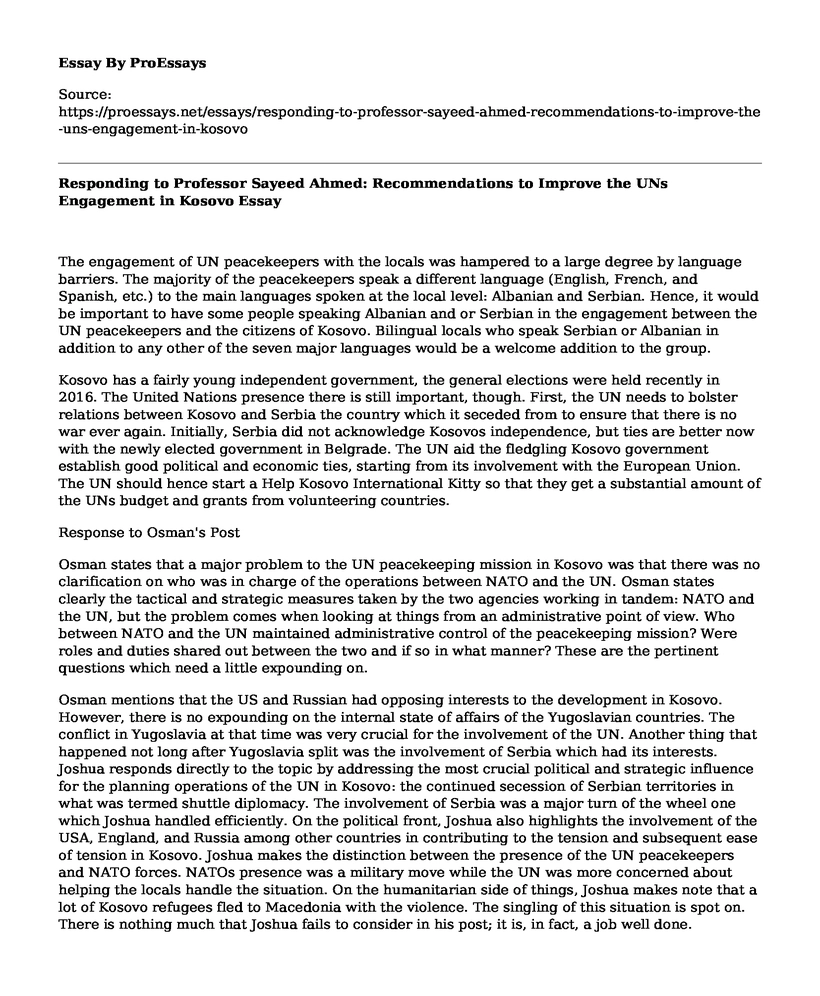The engagement of UN peacekeepers with the locals was hampered to a large degree by language barriers. The majority of the peacekeepers speak a different language (English, French, and Spanish, etc.) to the main languages spoken at the local level: Albanian and Serbian. Hence, it would be important to have some people speaking Albanian and or Serbian in the engagement between the UN peacekeepers and the citizens of Kosovo. Bilingual locals who speak Serbian or Albanian in addition to any other of the seven major languages would be a welcome addition to the group.
Kosovo has a fairly young independent government, the general elections were held recently in 2016. The United Nations presence there is still important, though. First, the UN needs to bolster relations between Kosovo and Serbia the country which it seceded from to ensure that there is no war ever again. Initially, Serbia did not acknowledge Kosovos independence, but ties are better now with the newly elected government in Belgrade. The UN aid the fledgling Kosovo government establish good political and economic ties, starting from its involvement with the European Union. The UN should hence start a Help Kosovo International Kitty so that they get a substantial amount of the UNs budget and grants from volunteering countries.
Response to Osman's Post
Osman states that a major problem to the UN peacekeeping mission in Kosovo was that there was no clarification on who was in charge of the operations between NATO and the UN. Osman states clearly the tactical and strategic measures taken by the two agencies working in tandem: NATO and the UN, but the problem comes when looking at things from an administrative point of view. Who between NATO and the UN maintained administrative control of the peacekeeping mission? Were roles and duties shared out between the two and if so in what manner? These are the pertinent questions which need a little expounding on.
Osman mentions that the US and Russian had opposing interests to the development in Kosovo. However, there is no expounding on the internal state of affairs of the Yugoslavian countries. The conflict in Yugoslavia at that time was very crucial for the involvement of the UN. Another thing that happened not long after Yugoslavia split was the involvement of Serbia which had its interests. Joshua responds directly to the topic by addressing the most crucial political and strategic influence for the planning operations of the UN in Kosovo: the continued secession of Serbian territories in what was termed shuttle diplomacy. The involvement of Serbia was a major turn of the wheel one which Joshua handled efficiently. On the political front, Joshua also highlights the involvement of the USA, England, and Russia among other countries in contributing to the tension and subsequent ease of tension in Kosovo. Joshua makes the distinction between the presence of the UN peacekeepers and NATO forces. NATOs presence was a military move while the UN was more concerned about helping the locals handle the situation. On the humanitarian side of things, Joshua makes note that a lot of Kosovo refugees fled to Macedonia with the violence. The singling of this situation is spot on. There is nothing much that Joshua fails to consider in his post; it is, in fact, a job well done.
Cite this page
Responding to Professor Sayeed Ahmed: Recommendations to Improve the UNs Engagement in Kosovo. (2021, Apr 06). Retrieved from https://proessays.net/essays/responding-to-professor-sayeed-ahmed-recommendations-to-improve-the-uns-engagement-in-kosovo
If you are the original author of this essay and no longer wish to have it published on the ProEssays website, please click below to request its removal:
- Paper Example on Spain Conflict between the Catalan Government and Madrid
- Costs of Higher Education Essay Example
- Miracle Works Agency Client System Analysis Paper Example
- Essay Example on Brexit Deal: Johnson Aims for UK Control, Flexibility at Cost
- Essay Example on the Future of Community Policing: A Comprehensive Analysis
- Essay on Rhetorical Strategies and Fallacies in President Obama's Call for Health Reform Mobilization
- Paper Example on Social Capital: Examining its Role in Reproducing/Producing Inequality







